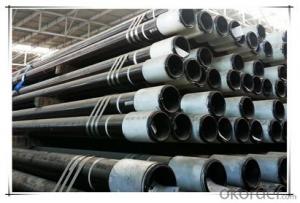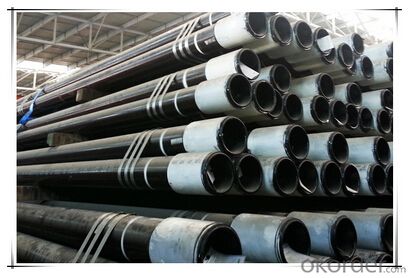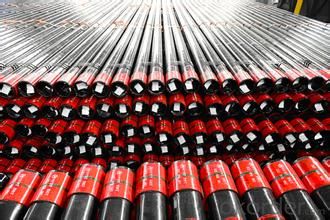H2S Anti Corrosion Cil Casing Tube
- Loading Port:
- China Main Port
- Payment Terms:
- TT or LC
- Min Order Qty:
- -
- Supply Capability:
- -
OKorder Service Pledge
OKorder Financial Service
You Might Also Like
Specifications
Economic products for anti- H2S+CO2+Cl corrosion oil casing
Steel Grades:BG80S-3Cr ,BG90S-3Cr
Anti- H2S+CO2+Cl corrosion oil casing
Products for anti- H2S corrosion
Steel Grades:BG80S,BG80SS,HS80S,HS80SS,BG95S,BG95SS,HS95S,HS95SS,BG110S,BG110SS,HS110S,HS110SS
Products for anti- CO2 corrosion
Steel Grades:L80-9Cr,L80-13Cr,BG55-1Cr,BG80-1Cr,BG90-1Cr,BG110-1Cr ,BG80-3Cr,BG90-3Cr,BG110-3Cr
Economic products for anti- H2S+CO2+Cl corrosion
Steel Grades:BG80S-3Cr ,BG90S-3Cr
Order Information | |||
Product |
| Material |
|
Standard | API, ASTM, EN, DIN, JIS | ||
Process Method | Cold drawn, Hot rolling | Deliver Condition | Annealing; BK, Normalizing, Quench, Tempering |
Outside Diameter |
| Wall Thickness |
|
Length | Max 13 meters | Pipes Ends | Plain, beveled, STC, LTC, BTC |
Destination |
| Unit Price | Send us pipes inquiry by mail. |
Surface | By varnish, anti-rusting black, polyethylene, galvanized coating, marking on the pipe | ||
Packing Ways | In hexagonal shape bundles wrapped with strong steel strip, a PVC bag, bundle with knitted plastic bag, wooden case, plastic cap, or according to customers' requests . | ||
Loading Quantity | Max 25-27 Metric Tons by one 20feet container. | ||
Delivery Time | Up to the order quantity or check whether has goods in stock or not. | ||
Application | Pipe is for low and medium pressure boiler, high pressure boiler, ship, liquid service, petroleum cracking, chemical fertilizer equipment, drawing-oil-equipment and structure purposes petrochemical industry, natural gas industry, environmental protection, pharmaceutical chemical, food machinery, water supply, architecture boiler heat exchangers, oil pipeline, pipe materials collar, Oil natural gas , industrial gas, water, oil transportation. | ||
FAQ of Anti Corrosion Cil Casing Tube:
①How is the quality of your products?
Our products are manufactured strictly according to national and internaional standard, and we take a test on every pipe before delivered out. If you want see our quality certifications and all kinds of testing report, please just ask us for it.
Guaranteed: If products’ quality don’t accord to discription as we give or the promise before you place order, we promise 100% refund.
②How about price?
Yes, we are factory and be able to give you lowest price below market one, and we have a policy that “ for saving time and absolutely honest business attitude, we quote as lowest as possible for any customer, and discount can be given according to quantity”,if you like bargain and factory price is not low enough as you think, just don’t waste your time.Please trust the quotation we would give you, it is professional one.
③Why should you chose us?
Chose happens because of quality, then price, We can give you both.Additionally, we can also offer professional products inquiry, products knowledge train(for agents), smooth goods delivery, exellent customer solution proposals.Our service formula: good quality+good price+good service=customer’s trust
SGS test is available, customer inspection before shipping is welcome, third party inspection is no problem.
Any question, pls feel free to contact us !
Anti Corrosion Cil Casing Tube Images
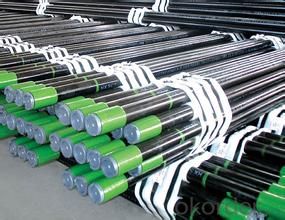
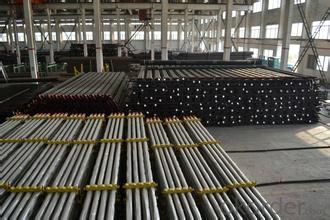
- Q: What are the different types of hangers used for supporting steel pipes?
- There are several different types of hangers used for supporting steel pipes, each with its own unique design and purpose. Some of the most common types include: 1. Clevis Hangers: These hangers consist of a U-shaped loop that is attached to a support structure using a threaded rod. The pipe is then placed inside the loop and secured in place with a bolt. Clevis hangers are often used in vertical pipe runs and provide excellent support and stability. 2. Split Ring Hangers: These hangers are designed with a split ring that wraps around the pipe and is attached to a support structure using a threaded rod. Split ring hangers allow for easy installation and adjustment, making them suitable for various pipe sizes and applications. 3. Pipe Clamps: Pipe clamps are simple and versatile hangers that consist of a metal clamp that wraps around the pipe and is secured to a support structure using screws or bolts. These hangers are available in various designs, such as one-hole, two-hole, or cushioned clamps, to accommodate different pipe sizes and provide stability. 4. Beam Clamps: Beam clamps are specifically designed to attach to overhead support beams or structures. They typically feature a clamp that wraps around the beam and a threaded rod or bolt that attaches to the pipe. Beam clamps are suitable for supporting horizontal pipe runs and are commonly used in industrial and commercial settings. 5. Roller Hangers: Roller hangers are used when there is a need for pipe movement due to thermal expansion or contraction. These hangers consist of a roller that allows the pipe to move freely while still providing support. Roller hangers are commonly used in long pipe runs or where there is a significant temperature variation. 6. Spring Hangers: Spring hangers are designed to support pipes and absorb vibrations or shocks. They consist of a spring element that is attached to a support structure and a rod or rod assembly that supports the pipe. Spring hangers are often used in applications where there is a need for noise reduction or to prevent damage caused by vibrations. These are just a few examples of the different types of hangers used for supporting steel pipes. The choice of hanger depends on factors such as pipe size, weight, location, and specific requirements of the installation. Consulting with a professional or engineer is recommended to ensure the appropriate hangers are selected for each specific application.
- Q: How do steel pipes handle extreme temperatures?
- Steel pipes are highly durable and can handle extreme temperatures due to their inherent strength and heat resistance. They have a high melting point, allowing them to withstand both very high and very low temperatures without compromising their structural integrity. Additionally, steel pipes have excellent thermal conductivity, which enables them to efficiently transfer heat and prevent damage caused by extreme temperature fluctuations.
- Q: What is the difference between steel pipes and plastic pipes?
- The main difference between steel pipes and plastic pipes lies in their material composition. Steel pipes are made from a durable and strong metal alloy, while plastic pipes are composed of various types of plastic polymers. This difference in materials leads to variations in their properties and usage. Steel pipes are known for their high strength, resistance to extreme temperatures and pressures, and longevity, making them suitable for applications requiring robustness, such as in industrial settings or underground pipelines. On the other hand, plastic pipes are lightweight, flexible, and corrosion-resistant, making them ideal for plumbing, irrigation, and other non-industrial applications. Additionally, plastic pipes are easier to install and handle due to their lighter weight and flexibility compared to steel pipes.
- Q: Can steel pipes be used for underwater applications?
- Yes, steel pipes can be used for underwater applications. Steel pipes are known for their durability and corrosion resistance, making them suitable for various underwater purposes such as offshore oil drilling, underwater construction, and marine transportation. Additionally, steel pipes can withstand the high pressure and harsh environmental conditions present underwater, making them a reliable choice for such applications.
- Q: How are steel pipes used in the automotive exhaust systems?
- Steel pipes are commonly used in automotive exhaust systems because steel is a durable and heat-resistant material. Steel pipes are used to transport the exhaust gases from the engine to the muffler and tailpipe, ensuring that the gases are safely and efficiently expelled from the vehicle. These pipes are designed to withstand high temperatures, corrosion, and vibration, making them an essential component in the exhaust system.
- Q: How do steel pipes handle seismic expansion joints?
- Steel pipes handle seismic expansion joints by allowing for movement and flexibility. These pipes are designed to withstand the forces caused by seismic activity, such as earthquakes, by accommodating expansion and contraction without causing damage to the overall structure. The joints in steel pipes are often equipped with specialized components, such as bellows or flexible couplings, that can absorb the movement and prevent excessive stress on the pipeline. This ensures the integrity and safety of the pipeline system during seismic events.
- Q: How are steel pipes used in nuclear power plants?
- Steel pipes are extensively used in nuclear power plants for various purposes. They are primarily used for the transportation of coolant, such as water or gas, which helps in removing heat from the reactor core. Steel pipes are also used to convey steam generated by the reactor to the turbine, where it is used to generate electricity. Additionally, steel pipes are utilized for the transportation of various fluids, such as lubricants and chemicals, for different processes within the plant. The durability, strength, and resistance to high temperatures and pressure make steel pipes an ideal choice for these critical applications in nuclear power plants.
- Q: What is the bending strength of steel pipes?
- The bending strength of steel pipes refers to the ability of a steel pipe to withstand bending forces without breaking or permanently deforming. The bending strength of steel pipes can vary depending on various factors such as the type and grade of steel, the diameter and thickness of the pipe, and the manufacturing process. Steel pipes are known for their high strength and durability, making them suitable for a wide range of applications. The bending strength of steel pipes is typically expressed in terms of the maximum bending moment or the maximum stress that the pipe can withstand without failure. To determine the bending strength of a steel pipe, engineers and manufacturers use various testing methods such as three-point or four-point bending tests. These tests apply a known force or moment to the pipe and measure its deflection or stress response. The bending strength of steel pipes can also be influenced by the pipe's mechanical properties, including yield strength, tensile strength, and elongation. These properties determine the overall strength and ductility of the steel, which play a vital role in its bending strength. It is important to note that the bending strength can vary depending on the specific application and load conditions. For example, pipes used in structural or load-bearing applications may require higher bending strength compared to pipes used for plumbing or conveyance purposes. In summary, the bending strength of steel pipes is determined by various factors such as the type and grade of steel, diameter and thickness of the pipe, and the manufacturing process. Testing methods and mechanical properties are used to evaluate the bending strength of steel pipes, ensuring their suitability for different applications and load conditions.
- Q: How are steel pipes used in the construction of oil-fired power plants?
- Steel pipes are commonly used in the construction of oil-fired power plants for various purposes. They are primarily utilized for the transportation of oil and other fluids within the plant, including fuel oil, lubricants, and cooling water. Steel pipes are also used for the installation of high-pressure steam and water lines, as well as for the construction of exhaust systems, ventilation ducts, and other structural components. Overall, steel pipes play a crucial role in ensuring the efficient and reliable operation of oil-fired power plants.
- Q: How are steel pipes transported?
- Steel pipes can be transported using various methods depending on their size, weight, and distance to be covered. The most common modes of transportation for steel pipes include trucks, trains, and ships. For short distances, steel pipes are often transported using trucks. They are loaded onto flatbed trailers or in some cases, specialized pipe trailers that are specifically designed to securely hold and transport pipes. These trucks can easily navigate local roads and highways, making them a convenient option for transporting steel pipes to nearby locations or construction sites. When it comes to long-distance transportation, trains are commonly used. Steel pipes are loaded onto flatcars, which are specifically designed to carry heavy loads. This method is preferred when transporting large quantities of steel pipes over long distances, as trains provide a cost-effective and efficient means of transportation. Moreover, trains are capable of transporting pipes of various lengths and diameters, making them a versatile option. For international shipments or transportation over bodies of water, steel pipes are often transported by ships. Steel pipes can be loaded into shipping containers or onto the deck of a cargo ship. Shipping containers provide protection from weather conditions and ensure the pipes remain secure during transit. Additionally, specialized ships equipped with cranes can handle large and heavy pipes, facilitating the transportation of oversized steel pipes. In some cases, pipelines can also be constructed to transport steel pipes directly from the manufacturing facility to the desired location. This method is commonly used for projects involving oil, gas, or water pipelines. The pipes are laid underground, eliminating the need for separate transportation. Overall, the transportation of steel pipes involves a variety of methods, including trucks, trains, ships, and pipelines, depending on the distance, quantity, and specific requirements of the project. Each method has its advantages and is chosen based on factors such as cost, efficiency, and logistics.
Send your message to us
H2S Anti Corrosion Cil Casing Tube
- Loading Port:
- China Main Port
- Payment Terms:
- TT or LC
- Min Order Qty:
- -
- Supply Capability:
- -
OKorder Service Pledge
OKorder Financial Service
Similar products
Hot products
Hot Searches
Related keywords
